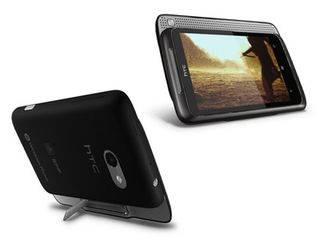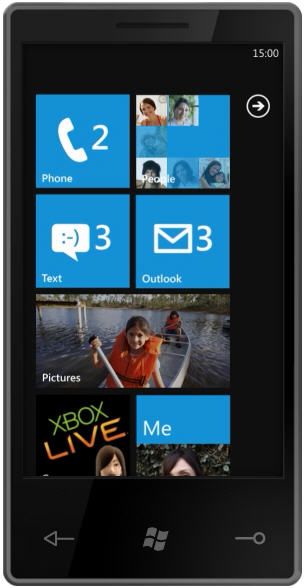Is the PSP Phone a Eureka Moment For Microsoft?
Pictures of the upcoming Sony Ericsson Zeus smartphone leave little doubt that Sony has a good shot at attracting an influential group of young customers that should have gone to Microsoft.


Pictures of the upcoming Sony Ericsson Zeus smartphone leave little doubt that Sony has a good shot at attracting an influential group of young customers that should have gone to Microsoft. It may be time for Microsoft to go back to the drawing board already and rethink what Windows Phone 7 really is.
A serious question: If you were asked to describe what Windows Phone 7 (WP7) is and what makes those phones Windows Phone 7 devices, what would you say? Personally, I'd be tempted to quote Microsoft's commercials that state that WP7 phones target those people who really don't like spending time with their phones. They are tools, rather than entertainment devices, designed to "get you in and out" of your communication tasks as quickly as possible. It's for all those who consider communication on a phone a distraction.
Could there be a more boring way to promote a new gadget? Aren't we generally happy with our smartphones and aren't we generally enjoying the connectivity those phones provide us with? Maybe there are some who actually respond to Microsoft's message, but I am not sure that those are the customers who actually drive technology adoption (and download apps to spend time on their phone) and I am wondering: If this is the unique selling feature of WP7, does WP7 really have a tempting identity?
If you simply look at what meets the eye, the WP7 lot consists of a bunch of hardly distinguishable smartphones (does anyone actually remember the differences?) that are conservatively designed to reflect current smartphones, but it would be a stretch claiming that Microsoft in fact is creating a trend or is even carving out a lucrative niche. It remains to be seen what the $500 million promotion pot can do, but so far, Microsoft did not do an especially good job positioning WP7 in the market. In fact, the platform may be in an identity crisis already.
We have seen this before with the Zune. It was an emotionless attempt to recreate the iPod that was amplified by the idea of a brown MP3 player, which I still believe was pure product sabotage. WP7 has about as much identity as the Zune, which is slightly above zero. Given the financial implication Microsoft can't be happy with WP7.
Identity
One way to create an identity for WP7 would have been a close tie to the Xbox 360 and leverage the entertainment capabilities of the successful console. It's a shame that Microsoft did not develop a fresh and dynamic phone that would do exactly that and appeal to a user crowd in the 20s and 30s.
Sign up to get the BEST of Tom’s Guide direct to your inbox.
Upgrade your life with a daily dose of the biggest tech news, lifestyle hacks and our curated analysis. Be the first to know about cutting-edge gadgets and the hottest deals.
I wonder how Microsoft reacted to the first pictures and videos of the Zeus, Sony Ericsson's Playstation phone. The slider phone does not feature a keyboard, but a familiar gaming-pad like layout. I had no issues identifying this phone as an entertainment device right away, while I am still struggling to remember the different features of individual WP7 devices. The Zeus is narrowly targeted, but highly emotional and transports its identity before Sony Ericsson has said a single word about it.
If Microsoft ever wanted to develop an Xbox 360 phone, this should have been the model. Within the WP7 line, this could have easily been the flagship model to carry the excitement and emotion WP7 needs so desperately. Of course, it would have contradicted the WP7 marketing message. People may actually want to spend time with the Zeus as opposed to WP7 users who are described as hiding their phones mostly in their pockets.
The Zeus is a solution for an aggressively designed, innovative and forward-thing mobile entertainment-communication device today's smartphones generally are. In comparison, the design approach of WP7 phones is underwhelming and lacks the necessary spice that would make them enticing. If no one at Microsoft has said it yet, I'll say it: Eureka! This future is a pure entertainment and game console phone!
Sony Ericsson is making a big bet with the Zeus, but it found a way to combine the functionality of an Android phone with the added entertainment functionality for those who want it. Should Sony Ericsson have used a more traditional keyboard? No. According to Mobclix, 46 percent of Android users anyway prefer a touchscreen over a keyboard anyway and it appears that this is especially true for younger users. While the survey of Mobclix revealed that 37 percent of Android users spend most of their time on the phone for emails, 21 percent spend most of their time in games. Does Sony have a case here? Absolutely.
The Zeus speaks to a very specific customer group and there is a chance that it won't be selling very well because of that. But this almost feels like Apple's original iPhone, which was built by Motorola and was a first shot at getting access to iPod users. Sony has a good chance to go down the same path and define future portable game consoles with a device that may not look much different than the Zeus. Microsoft missed that opportunity by slapping Xbox integration on to boring phones. Will the average WP7 buyer use Xbox Live on those phones? Unlikely. Will Xbox enthusiasts be interested in a WP7 phone? That may depend on what features Microsoft will add, but the design of the current devices is surely a turn-off.
Fixing Windows Phone 7
Seriously, Microsoft. It's not that hard. Just give us something what we don't have already. There is no need for a device that is better than Android or the iPhone. Why don't we see something different that pulls in the vast research resources and technologies that exist within Microsoft? The last time I held a WP7 phone in my hands, I was wondering if this was really the best Microsoft could do with its partners and if this is the best that a billion dollar budget could deliver.
The Seabird phone that recently was published on the Mozilla Labs website is an example of progressive thinking that seems to be lacking at Microsoft. Apple has clearly created an identity for the iPhone as the origin of the modern smartphone and app landscape, Google is defining Android with a foundation of fantastic applications and enormous functionality. Microsoft needs to create its own identity. Otherwise it will go down the path of Zune and get lost on retail shelves.
For Microsoft, the Zeus is the best example yet how to break into the buzzing smartphone market that is dominated by a few, but incredibly very strong players. Microsoft needs to realize that it is the underdog and hundreds of millions of marketing dollars will evaporate in thin air if its products are plain, boring and lack identity.
Perhaps someone from Apple could help Microsoft out?
Most Popular

